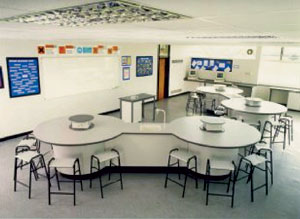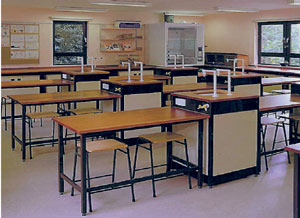| 2003 |

|
YEAR BOOK |
University of Limerick
|
Science can be real good fun
|

The supply of students to undertake studies in science to degree and sub-degree level depends on the interest in science created in the earlier school years. This interest seems to deteriorate during the period of Junior Cycle and impacts negatively on the selection of science subjects for Leaving Certificate. Junior Certificate students state overwhelmingly that they do not find science enjoyable but, more than anything else, they enjoy practical work. A traditional approach to science teaching where teachers and students perform clearly defined experiments in 'cook book' style does little to encourage students to develop a positive attitude to or enthusiasm for science. More effective teaching of science, including group work and opportunities for interaction, project work and a focus on exploration and investigation, will develop curiosity, precision and perseverance in students.

The school science laboratory of the future will look very different in design to those currently in the majority of schools. Students, working in small groups around a central 'pod' will be able to relate to each other and learn science more easily in bright, attractive laboratory environments supplied with modern equipment, including computer technology and internet access. Teachers are by nature very enthusiastic and they too can function to a higher standard when working in a more effective, exciting and stimulating educational environment.
Newly updated and attractive science programmes in Junior Science and Senior Cycle Physics, Chemistry and Biology are now offered in schools, while others (Agricultural Science and Physical Science) are planned. A new science programme was also introduced to Primary schools this year.
Science is not only great fun to learn but also provides a very strong basis for an interesting and rewarding career.
Contact: Frank McGourty, Senior Lecturer, Department of Life Sciences, University of Limerick; E-mail: [email protected]